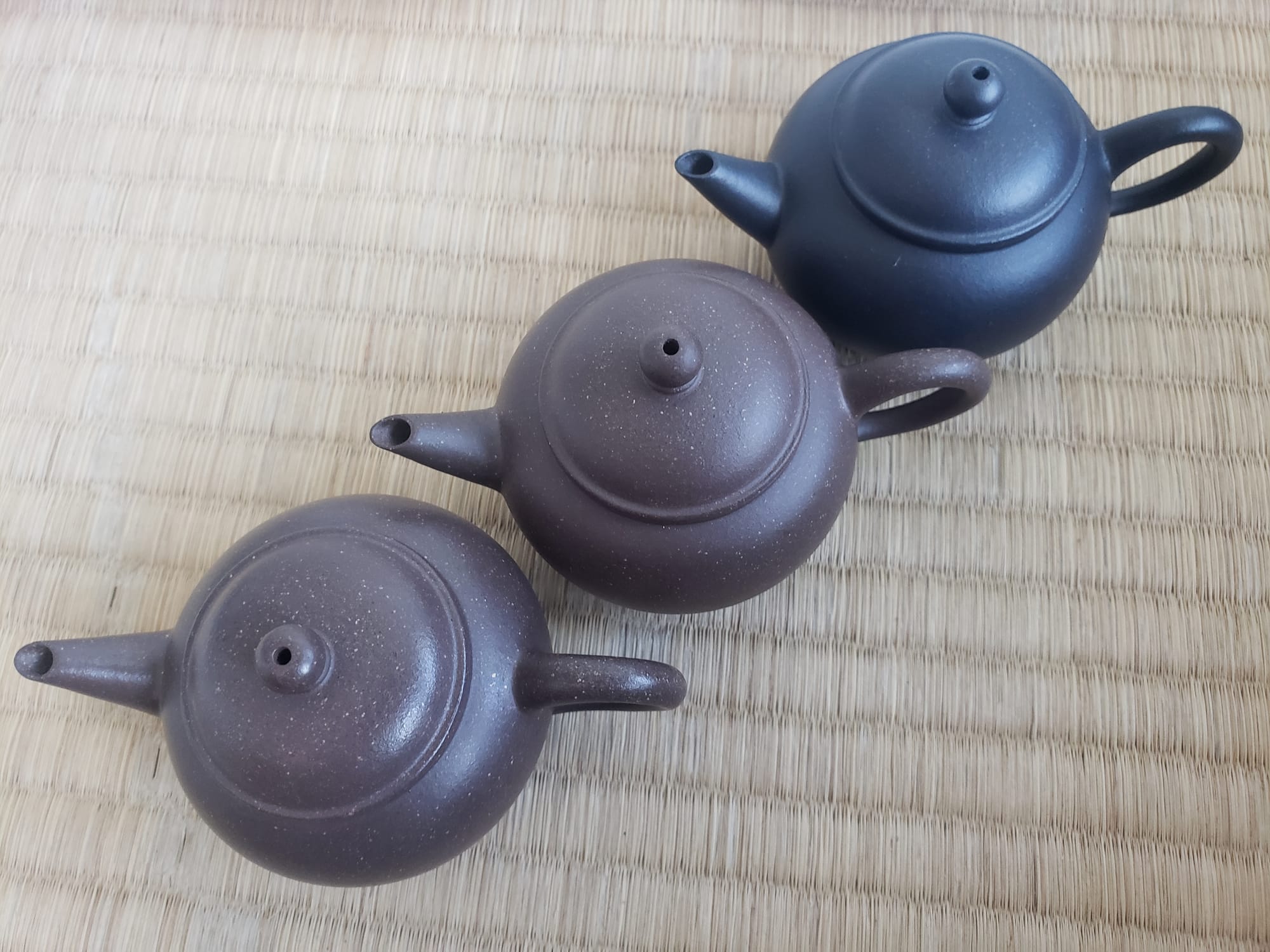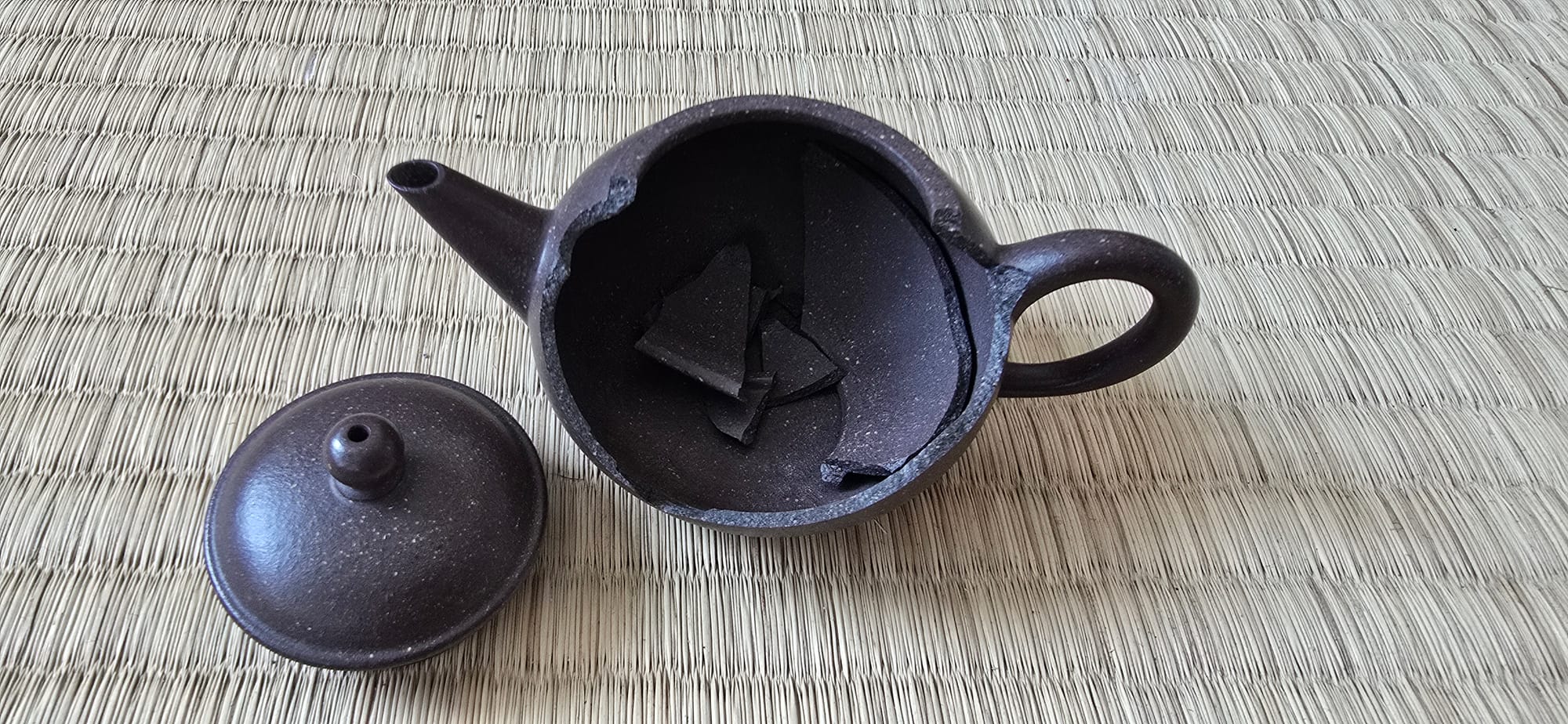Object Impermanence: A Fleeting Forlorn Future
A friend, a good friend, a conscientious friend knocked a teapot off my shelf. It wasn't rare, or expensive, or antique. It was, in fact, purposely flawed, part of a set I commissioned to study for the book on Yixing teapots.

The set, now incomplete; the tea session interrupted. There was no anger or resentment that welled up, no proclamation of "you should have...!" - we saw it happen in slow motion, the sleeve catch, the teapot tumble. It may have survived, if not for the (rare and expensive) cup it landed on (which did survive, unharmed).
Instead, a deep sense of loss, far beyond the value or importance of the teapot, washed over me. A forlorn future stretched out before me, carrying with it this set, now incomplete. Such feeling of loss made it more difficult to continue on with the session, with the conversation, with being present and enjoying the tea and company. Nothing would bring the teapot back, and yet I felt an immediate need to work on a replacement, to coordinate and plan and find a replacement to fill the hole in my missing set.

Many religions and philosophies teach that you should keep a distance, a detachment, from your possessions; that desire is the root of suffering. And suffering I was – suffering the thoughts about all the tea I would or could have brewed in this flawed ware, all the experiments left to be completed, the work of studying and writing left undone. I was suffering through the contemplation of my past and future, considering what more I could had done in the brief time I had the teapot in my possession, what I could be doing had the teapot remained unbroken.
I commissioned a replacement. The same details, only a different ganzhi year, and a later batch of clay, marking the difference. And with the solution, the forlorn future I fixated on receded into the distance. Flavor returns to my tea. Motivation returns to my writing. What was a weight on my conscious floats away. Would it have been so easy if it was a less replaceable teapot? If it was a rare antique, one of my prized possessions, on that very same shelf?
If the broken teapot can be substituted and the suffused suffering stopped, by a distinctly different item, then the original object played only a minor role in the focus of my desire. The collected objects are inanimate, they bear no connection or meaning beyond what we project onto them; the teapot can't love you back, unconditionally like a slovenly dog, contextually like a cat, or not at all like a person. Perhaps any item, filling the conceptual gap in the collection, would suffice.
The drive to catalogue, collect, maintain, preserve, and use items of value is a form of culture, a set of embodied desires that have evolved with our individual and collective cultures since time immemorial. What has been collected, and the value placed on the items collected, has varied wildly with taste and fashion and status and culture - and yet that feeling, that feeling of regret or remorse when an item from within the collection is lost, is the same. The avoidance of that feeling is part of the urge to collect and maintain. The early teachings of Buddhism, in its Indian infancy, its teachings on possessions and desires, were aimed at the educated and wealthy - aimed at those who had or could purchase items worth desiring. Buddhism for the masses came later, integrating folk-beliefs and messianic messaging, focusing more on salvation after this life than on improving ones being during this life. Buddhism spread in bastardized forms; its early entry into Tibet, its presence in Greece before China, its foray in central Asia – each receiver of the message amplified only their resonant patterns. The variations in Buddhism that resonate today vary with wealth and education and status; our bastardized pick-and-choose its-a-philosophy-not-a-religion Buddhism of the west has kept, rejected, or corrupted the message to fit and resonate with our culture. The message is spread because it resonates, the message survives because it works for those who spread it.
Happiness comes in many forms. Some objects make me happy. My teapots make me happy. Their loss makes me suffer, their presence burdens me with careful care. Should I stop collecting them? Should I stop enjoying the fleeting permanence of my objects to prevent future suffering?
The message has been corrupted; I develop connections with inanimate objects, ascribing meaning and values to select things, objects of utility, functional tools for a culture I have adopted in a pick-and-choose what resonates form of fashion. I commissioned the replacement set as closely as I could; it fills the gap but is not the same, cannot be the same. The replacement suffices; it will serve my purpose. My collection brings joy and suffering, more joy than suffering on most days.
I'll keep collecting.